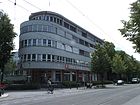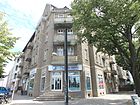List of cinemas in Berlin-Alt-Hohenschönhausen
The list of cinemas in Berlin-Alt-Hohenschönhausen gives an overview of all cinemas that have existed in today's Berlin district of Alt-Hohenschönhausen . The list was built according to information from research in the Kino-Wiki and linked to connections with Berlin's cinema history from further historical and current references. It reflects the status of the film screening facilities that have ever existed in Berlin as well as the situation in January 2020. According to this, there are 92 venues in Berlin, which means first place in Germany, followed by Munich (38), Hamburg (28), Dresden (18) as well as Cologne and Stuttgart (17 each). At the same time, this compilation is part of the lists of all Berlin cinemas .
| Name / location | address | Duration | Description, possibly picture |
|---|---|---|---|
| Hohenschönhausen plays of light
( Location ) |
Werneuchener Strasse 22 | 1943 |
shown in the Berlin address book in 1943 ; no further indications of the existence of a cinema can be found at this point. |
| Hohenschönhauser Tonlichtspiele
( Location ) |
Konrad-Wolf-Strasse 93 | 1933-1943 |
The "HTL" cinema was located at Berliner Straße 93, adjacent to house 94 at the corner of Reichenberger Straße. The cemetery of the St. Markus and St. Andreas parish is on the opposite side of the street. The cinema was in the war by bombs destroyed. After the ruins had been cleared, plot 93/94 was fallow - later a green area. In the 1990s, a new building with commercial use (pharmacy, optician, shared apartment) was built. Max Leuschner from Berlin-Hohenschönhausen (Werneuchener Straße 22) previously ran a shop cinema with 150 seats that was only a short distance away. The theater opened in 1933 (Ton-Lichtspiele Hohenschönhausen, Hohenschönhausener Tonlichtspiele) had a capacity of 500 seats, a cinema stage measuring 7 m × 5 m and was expanded for the sound film right from the start. The cinema enabled daily games with several shows. From 1937 Else Leuschner (also from Werneuchener Straße 22, later Rödernstraße 23) took over the cinema and expanded it to 575 seats, in 1941 it was rebuilt again so that the stage was 6.5 mx 1.8 m in size. After the total hit, it was no longer possible to use it as a cinema. |
| Reform Theater
( Location ) |
Konrad-Wolf-Strasse 76 | 1911-1934 |
The cinema was in the corner house on Berliner Strasse (since 1985: Konrad-Wolf-Strasse) and Lüderitzstrasse (since 1984: Sandinostrasse). The later use was business premises, later a pharmacy and currently a shop for ice hockey accessories, opposite has been the Sportforum since the 1960s . In the cinema directory, 1911 is given as the year the shop cinema was founded . In 1917 Max Leuschner (who lives in the house) owns the “Reform Theater” and offers a “mixed program” with 160 seats on the weekend (Friday to Monday) at an entrance price of 30 to 60 pfennigs. From 1920 on two days of the summer (from 1921 on three days) and daily in winter, from 1924 two program changes per week are noted. In 1927 Eduard Redell took over the cinema with 148 seats from 1929 with 170 seats for daily screenings. In 1931 Max Leuschner (residing in Berlin-Weißensee, Berliner Allee 63, from 1934: Berlin-Hohenschönhausen, Werneuchener Straße 22) took over again and in 1934 he expanded the Reform-Lichtspiele for sound film, whereby the Reform-Lichtspiele offered 148 seats. Probably for financial reasons, however, he ceased operations when he opened a new venue 400 meters away with more space. |
| Solita Sonnen-Lichtspiel-Theater ( Location ) |
Landsberger Allee 277 | 1933-1939 | The cinema was at Landsberger Chaussee 91 , the address information has changed due to renaming and re-naming and the associated land count. The single house was located on the (west) corner of Genslerstrasse on the property at Genslerstrasse 26. In 1933, an extension to the existing house (built after 1928) was a hall cinema with 222 seats as a solitaire (sun-light theater ) opened. Walter Buwert was named as the owner (for 1939) and 150 seats were given. Because the technology did not allow sound films, the cinema was probably closed. The building with the Zur Sonne restaurant was not damaged in the war and was still standing in the 1970s. With the expansion on Genslerstrasse and along Leninallee (since 1991: Landsberger Allee), the existing old building was replaced with the extension at the end of the 1970s by the HO club restaurant Schillerglocke , which took the name of the traditional Schillerglocke pub on the Landsberger (which had already been cleared at that time) Allee and Hohenschönhauser Strasse took over. The Allee Center (a shopping center for the area and on the road to Marzahn ) has been located at Landsberger Allee 277 since 1994 . |
|
Venus Eagle Owl Movie Stage ( Location ) |
Degnerstrasse 9 | 1947-2004 |
The cinema on the Degnerstraße track loop served as a depot for the Berlin – Hohenschönhausen electric train until 1929. It then became a food factory. After a devastating bomb hit in 1943, it came into the possession of Anna and Georg Reichardt only after the end of the war. They had the hall rebuilt from the rubble and set up the Uhu cinema in it . It was owned by the state between 1959 and 1990, after which it was re-privatized. Game operations could be maintained until 1998, after which there was another attempt until 2004. Then it closed for economic reasons. An investor began a renovation in the summer of 2007, but the new use as a café in the former foyer and offices and lofts in the rest of the building did not materialize. The building between a restaurant / music school (old fire station) and a retirement home has been empty since then (as of July 2016). |
literature
- Astrid Bähr: Alhambra light plays . In: Sylvaine Hänsel, Angelika Schmitt (eds.): Cinema architecture in Berlin 1895–1995 . Berlin 1995.
- Esther Sabelus, Jens Wietschorke: The world in light. Cinema in East Berlin 1900–1930 with a Berlin cinema ticket. Panama Verlag, Berlin 2015, ISBN 978-3-938714-34-8 .
Web links
The Kino Wiki is currently hosted on filmtheater.square7.ch . The data was compiled from the special address books Reichskino Adressbuch (Verlag Lichtbühne) and Kinoadressbuch (Verlag Max Mattisson) as well as the cinema list (1907–1910) of the first specialist journal for all of the art of photography, Der Kinematograph . The project of the Berlin cinemas is based on this data and supplements regional references.
- Film theater history in Germany, Austria and Switzerland
- Berlin's independent cinema guide
- On the trail of cinemas - all cinemas in the computer . In: Berlinische Monatsschrift , 12/1996, at the Luisenstädtischer Bildungsverein
Remarks
Individual evidence
- ↑ Kino-Wiki main page, accessed on January 18, 2020. Kinowiki deals with the history of movie theaters in Germany and tries to collect all information about movie theaters and movie theaters in Germany. It is sorted according to federal states and cities. Everyone is called upon to supplement the data or correct errors.
- ↑ The breakdown by districts and districts is based on the district reform of 2001.
- ^ Stefan Strauss: Film? Running. Publication in the Berliner Zeitung , March 27, 2017, p. 13.
- ↑ List of cinemas in Berlin 1943 cinemas (in alphabetical order) . In: Berliner Adreßbuch , 1943, II, pp. 430–431.
- ↑ ( Page no longer available , search in web archives: Plan of Berlin. Sheet 4226 ). X = 30570, Y = 23733
- ↑ ( Page no longer available , search in web archives: Plan of Berlin. Sheet 4227 ). X = 30260, Y = 23515
- ^ At the corner of Genslerstrasse: ( page no longer available , search in web archives: plan of Berlin. Sheet 4226 ). X = 31265, Y = 23040
- ↑ Restaurant bill of the Schiller bell



